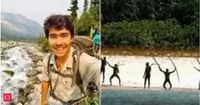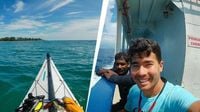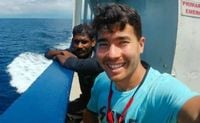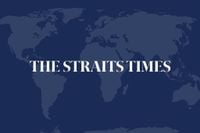In a startling incident reminiscent of past tragedies involving outsiders and the isolated Sentinelese tribe, American tourist Mykhailo Viktorovych Polyakov was arrested for illegally entering North Sentinel Island, part of India’s Andaman and Nicobar Islands. This island, known for its fiercely protective indigenous inhabitants, has been off-limits to outsiders for decades, primarily to preserve the tribe's autonomy and protect them from external diseases.
Polyakov, 24, arrived in Port Blair on March 26, 2025, and made his way to North Sentinel Island on March 29. Launching his boat from Kurma Dera beach around 1 AM, he traveled approximately nine hours to reach the island's northeastern shore, arriving by 10 AM. In a bid to connect with the Sentinelese, he brought offerings of a coconut and a can of cola, which he left on the beach as a gesture of goodwill.
However, his attempts to attract the attention of the tribe were met with silence. After spending about an hour offshore, blowing whistles and surveying the area through binoculars, Polyakov decided to briefly land on the island. He spent only five minutes on the shore, during which he collected sand samples and recorded a video of the area before returning to his boat. He reached Kurma Dera beach again by 7 PM.
Authorities became aware of Polyakov's actions when local fishermen spotted him near the beach and alerted the police. His arrest occurred on March 31, just two days after his visit to the island. Police Chief HGS Dhaliwal confirmed that Polyakov had been placed on a three-day remand for further interrogation and that he is facing charges under the Foreigners Act of 1946, as well as the Andaman & Nicobar Islands (Protection of Aboriginal Tribes) Amendment Regulation of 2012.
Polyakov's case echoes the tragic fate of John Allen Chau, an American missionary who was killed by the Sentinelese in 2018 after attempting to contact them. Chau had made several visits to the island, bringing gifts and attempting to preach Christianity. His death highlighted the dangers of interacting with the tribe, which has a long history of violently rejecting outsiders. In Chau's case, he was shot with arrows shortly after landing on the island, and his body remains buried there to this day.
In contrast, Polyakov’s visit, although illegal, did not result in violence, as he failed to make contact with the tribe. The Sentinelese are known to be one of the last uncontacted peoples on the planet, living in isolation for thousands of years. Their territory is protected under Indian law, which prohibits any contact with the tribe to safeguard their way of life and prevent exposure to diseases.
Polyakov's previous attempts to reach the island included an effort in October 2024, when he attempted to use an inflatable kayak but was stopped by hotel staff. He returned in January 2025, where he traveled to the Baratang Islands and reportedly filmed the Jarawa tribe without permission. His meticulous planning for the latest trip included researching sea conditions and using GPS navigation, indicating a determined effort to reach the island.
As the investigation continues, authorities are also looking into whether anyone assisted Polyakov in his endeavors. The Indian government has strict regulations in place regarding access to the Andaman and Nicobar Islands, particularly to protect the indigenous tribes from external threats. All outsiders, including both Indians and foreigners, are prohibited from traveling within 5 kilometers of North Sentinel Island.
In the wake of Polyakov's arrest, discussions have emerged regarding the balance between tourism and the protection of vulnerable tribal communities. The Andaman and Nicobar Islands are home to several indigenous tribes, including the Jarawa and Onge, who also face threats from outside contact. Activists have long argued for the rights of these communities, emphasizing the need for their protection from the encroachment of modern society.
Polyakov's case serves as a reminder of the complexities surrounding indigenous rights and the responsibilities of travelers. While curiosity about uncontacted tribes can drive individuals to take risks, the consequences can be dire, both for the visitors and the indigenous peoples.
As the situation unfolds, the Andaman and Nicobar Islands' authorities are likely to reinforce their policies regarding access to tribal areas. The tragic history of interactions with the Sentinelese and other tribes must inform future efforts to protect these vulnerable communities.






